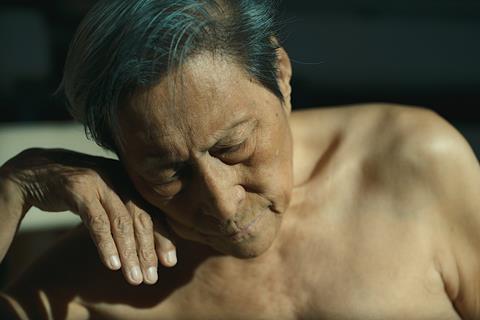Composer Wang Xilin recalls his painful past in China’s Cultural Revolution in Wang Bing’s unusual documentary

Dir. Wang Bing. France, US, UK. 2023. 60mins
Wang Bing is known as a specialist in sometimes punishing duration – witness his 2023 Cannes competition entry Youth (Spring). By contrast, Man in Black, which plays Special Screenings, lasts only an hour but packs in the painful intensity of a century of modern history, as experienced by one artist; 86-year-old Chinese composer Wang Xilin, not wearing black but filmed entirely naked. In fact, he’s cloaked in shadows, and the title – a reference to a song Wang sings – conveys the sense that the film is something like a painted portrait.
It’s a sobering, striking work – as much performance piece as documentary
Austere in the extreme, yet emotionally matching Wang’s orchestral work in its sheer intensity, the film is a very niche proposition. Beyond the strictly cinematic sphere, it should spark interest in the art world – it’s a dead cert for gallery screenings – and among adepts of modern classical music.
Shot by French star DoP Caroline Champetier, the film shows Wang naked throughout, in the darkened surroundings of Paris’s famed Bouffes du Nord theatre, its distressed, exposed walls echoing the textures of the composer’s weathered octogenarian body. In the film’s first section, Wang descends from the balcony to the stage, where he adopts various dance-like postures, Champetier’s camera slowly wheeling around him — sometimes up close, mapping his body in the manner of a painting by Lucian Freud or Francis Bacon. The latter comes to mind specifically because of some of Wang’s more tortured positions, suggestive (as the film will confirm) of the traumas of the Cultural Revolution. Wang also sings a wordless song, and plays extracts from his Piano Concerto, while we also hear parts of his hugely dramatic, starkly modernist Third and Fourth Symphonies.
Then Wang, seated, at last speaks and recounts his experience of Chinese Communism, from his early days as an enthusiastic Party member – joining the People’s Liberation Army in 1949 – to his hard-won awareness that the ideology had become, as he puts it, “a cruel, merciless betrayal”. Wang’s belief that musical technique was vital to artistry, and not to be subjugated to political purpose, led to his denunciation and marginalisation. Once the Cultural Revolution got under way, by which point Wang had already suffered a nervous breakdown, his troubles intensified.
Wang underwent extended rounds of beating, and experienced, and witnessed, worse yet – as he tells us, at various points tearing up or manifestly showing his fury at what was done to him and so many of his contemporaries and mentors. He makes it clear how much certain passages of his music are directly intended to represent certain experiences: the horror of being literally caged, or the practice of burning human flesh. Wang Bing’s counter-intuitive yet strikingly effective technique in this section of the film is to intermittently have the composer’s voice drowned out by surges of his music, which sometimes cut out abruptly, although his words are still always readable in subtitles.
Western viewers and listeners are likely to be unfamiliar with Wang Xilin’s work, and Man in Black offers him intensive exposure. It’s a sobering, striking work – as much performance piece as documentary per se, and a notable departure from Wang Bing’s usual objective observational mode. It’s also a devastating testimony to the horrors of the last century in China, but also to the powers of endurance of an artist whose creativity has been as closely interwoven with the troubles of his age as, say, Shostakovich’s was with the Stalin era.
Production companies: Gladys Glover, WIL Productions
International sales: Asian Shadows, maria@chineseshadows.com
Producers: K. Lihong, Sonia Buchman, Nicolas R. de la Mothe
Cinematography: Caroline Champetier
Editor: Claire Atherton
Music: Wang Xilin






![The Brightest SunScreen[Courtesy HKIFF]](https://d1nslcd7m2225b.cloudfront.net/Pictures/274x183/3/5/0/1448350_thebrightestsunscreencourtesyhkiff_312678.jpg)















![The Brightest SunScreen[Courtesy HKIFF]](https://d1nslcd7m2225b.cloudfront.net/Pictures/100x67/3/5/0/1448350_thebrightestsunscreencourtesyhkiff_312678.jpg)

